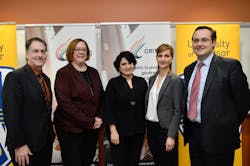CUTRIC Partners launch the first research group on smart and autonomous vehicles
The Canadian Urban Transit Research and Innovation Consortium (CUTRIC) has received more than C$1.1 million (US$818,744) In funding from its partners and the Canadian federal government.
This funding will be used to establish the National Academic Cluster for Smart Vehicles (NAC-SV). Both Irek Kusmierczyk and Brian Masse, the Members of Parliament for Windsor-Tecumseh and Windsor West, respectively, spoke at CUTRIC's funding announcement hosted at the University of Windsor, showing support for CUTRIC, its partners and transit mobility.
CUTRIC and its members are contributing C$797,900 (US$593,887) in funding, with an additional C$306,500 (US$228,132) coming through the federally-supported Mitacs Accelerate and Mitacs Career Connect programs, and through ECO Canada and BioTalent Canada.
NAC-SV is designed to standardize technology associated with autonomous and connected vehicles for use in transit and mass-mobility. It brings together several manufacturers of small, autonomous transit vehicles known as shuttles, and will allow them to coordinate short-range vehicle-to-vehicle and vehicle-to-infrastructure communications, improve cybersecurity, develop software to manage digitized shuttle fleets, and use standardized charging systems. All of this will ensure that first-kilometer/last-kilometer (first mile/last mile) transit is implemented in a cost-effective manner.
"These shuttles service Canadians by filling a critical gap in our transit system and providing a much-needed service on routes that are too small to justify a bus route," explained Josipa Petrunic, executive director and CEO of CUTRIC. "Smart electric shuttles can provide the flexibility and cost efficiency needed to get Canadians to a transit hub."
'First-kilometer/last-kilometer' is the term that the transportation industry uses to describe the start and end of transit users' experiences, which can have a significant impact on how and if one will use transit. In more remote areas, or centers with sprawling development patterns, gaps in public transit coverage can often result in efficiencies with travel time and can lead to car dependency, says CUTRIC. One of the primary goals of NAC-SV is to provide the research to enable flexible and reliable transit service for those living in first-kilometer/last-kilometer areas, an underserved population.
"The establishment of a National Academic Cluster for Smart Vehicles at the University of Windsor will position our region at the forefront of research-industry collaboration that is developing cutting edge public transit and mobility solutions. This investment will advance environmental sustainability and help develop the talent necessary in Windsor-Essex to accelerate our local and national clean tech sector, drive job creation and fuel our region's prosperity," said Kusmierczyk, Member of Parliament for Windsor—Tecumseh and Parliamentary Secretary to the Minister of Employment, Workforce Development and Disability Inclusion.
"This project and the work of the partner institutions involved, including the University of Windsor, will go far in improving public transit outcomes for residents of Windsor and Canadians across the country," said Member of Parliament Masse.
NAC-SV aims to achieve multi-manufacturer interoperability so that cities and transit agencies can mix and match autonomous shuttles on the same routes. The University of Windsor will play an important part in this, says CUTRIC.
"The University of Windsor is committed to fostering sustainable industry and building viable, healthy and safe communities in our region, our country and beyond,” said Dr. K. W. Michael Siu, vice president, Research and Innovation, University of Windsor. “Not only will the generous funding provided by the Canadian Urban Transit Research and Innovation Consortium in support of the first National Academic Cluster for Smart Vehicles contribute to significant advancements in autonomous and connected vehicle knowledge and technological innovation, but it will facilitate training of next-generation researchers, engineers, industry leaders and decision makers in smart vehicle science."
Project partners include 2GetThere, ABB, Bombardier, Carleton University, CUTA, EasyMile, eCamion, Kingston Transit, London Transit, NAVYA, Pacific Western Transit, Queen's University, SmartCone, St. Catharine's Transit, Thales Group, Transit Windsor, University of Quebec-Trois Rivieres, University of Calgary, University of Toronto, University of Waterloo, University of Windsor and Woodstock Transit.
